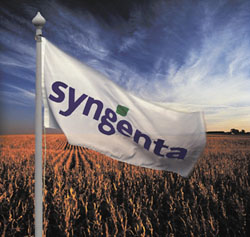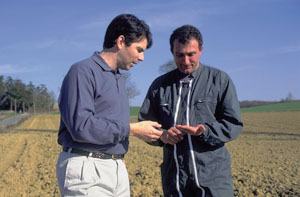PLEASE VISIT OUR NEW WEBSITE
 Syngenta, formerly Zeneca Agrochemicals, are one of the global leaders in providing innovative solutions and brands to growers and the food and feed chain. The library, based at the Huddersfield site, purchased Heritage in March 2000.
Syngenta, formerly Zeneca Agrochemicals, are one of the global leaders in providing innovative solutions and brands to growers and the food and feed chain. The library, based at the Huddersfield site, purchased Heritage in March 2000.
Rita Leatherbarrow was the librarian at that time. She first heard about Heritage when she was searching the Internet for library management systems to replace Dobis Libis, her existing system.
“We looked on the Internet [for] what other systems were around. It had to be good value for money as we are not a large library but at the same time it had to meet our needs. A colleague of mine had heard it was an easy to use reliable system. We also had to consider getting our data out of Dobis Libis - our library’s data had to be extracted. [I.S. Oxford] offered a lot of help and support in doing this for us.”
Rita was quite clear about what she wanted from a replacement system:

“It had to be compatible with company IT systems. [We also needed] to convert our data from the existing system into formats required by the Heritage system. [We wanted a] user friendly, easy to use windows-based system. Best of all, [in Heritage] you can set up your library without any IT help other than them loading the software. You can set up Heritage to meet the demands of your own library”.
Rita arranged for an on-site demonstration from IS Oxford, and Emma Duffield guided her through the many features of Heritage and answered her specific questions. Rita was particularly pleased with the attitude of the sales staff at I.S.: “[They were] very helpful and understanding. They were as keen as we were to make sure what we needed was right for us and [we felt] under no pressure from them to buy.” Since purchasing the system she has found that this is the pervading attitude throughout the company: “They are very quick to offer support no matter how trivial the problem.”
Once Rita had decided that Heritage was the most likely system to meet their requirements she requested an evaluation copy of the software to trial. She worked with a colleague, using the demonstration library database and Heritage documentation to work through the system:
“I spent about 16 hours over a period of 4 weeks testing it. I found it to be very useful and easy to use. We had the manual to go with it and found it very straightforward, [with] no IT jargon to throw you into confusion”.
It was the simplicity and flexibility of Heritage that appealed to Rita:
“It can be set up to meet the needs of your Library. I am not an IT expert and found it so simple and enjoyable setting it up. We are a small Library and if we expand it has the capabilities and flexibility to be a much larger system at a sensible price.”
Rita went ahead and purchased Heritage. The next step was to convert all the Dobis Libis  data into Heritage. This process was undertaken by the IS data conversion team.
data into Heritage. This process was undertaken by the IS data conversion team.
“The biggest problem was getting our data out of Dobis Libis which had data in it belonging to other parts of the company which where no longer part of our organisation (but they owned the Dobis system). We only had a few months [and IS staff] worked very closely with our IT staff and myself in ensuring the data we required was transferred. [IS Oxford] did the conversion, which they sent to me on a floppy to ensure it was correct. They were very helpful in supporting our needs and kept in regular contact with us to meet our requirements. Once satisfied the Heritage software was loaded and we only needed to use a paper system for a maximum of two weeks. During that time we spent one day at IS Oxford for training. Once we went live I had the overdue system and our temp paper system in Heritage and we were up and running. Now I could spend my time polishing and cleaning the system to meet our own needs.”
Since most of the stock had been catalogued on Dobis Libis, Rita did not have much additional cataloguing to undertake following the conversion. They did want to make changes to the classification system they used, however, and IS staff helped them undertake this changeover.
“We were using the UDC classification system and wanted to move to Dewey. Our book supplier provided the classification details for the majority of our books which had ISBNs and sent it as an Excel document, which was then sent to the Support Team who did the changeover. This was then sent back to us on a disk and it took all of a few minutes to load and convert our class numbers. The records without ISBNs were classified by our staff and only took about a week.”
Rita has advice for all new Heritage users that have booked training courses: “Before any training was given I read and worked through the evaluation manual, so for me the course at Oxford was easy. It meant I could ask lots of questions and not worry about this basic course.” She thinks that good documentation is very important, and that other users might also make use of it in addition to sending requests to the Heritage list server (known as Marvin):
“I feel if everyone who uses Heritage went through the manual at the evaluation stage we would not see such a large number of questions appearing through the Marvin group. It might help if people referred to the manuals more often. I would prefer a manual at the side of my desk and the final updates sent out once a year so you are not having to refer to the web pages – this could be some of the problem hence large number of questions put to Marvin.”
 Rita has since used Heritage to catalogue all her library stock, whatever the media type. They have 45,000 items, which comprise “books, CDs, videos, cassettes, pamphlets, theses, translations, Internal Experimental Notebooks and Internal Reports.” She says that Heritage has made a huge difference to her library:
Rita has since used Heritage to catalogue all her library stock, whatever the media type. They have 45,000 items, which comprise “books, CDs, videos, cassettes, pamphlets, theses, translations, Internal Experimental Notebooks and Internal Reports.” She says that Heritage has made a huge difference to her library:
“I was amazed at the many varieties of reports that you can create and this gave us all the help we needed to clean our data and get rid of all inconsistencies. The Dawsons import module was a bigger surprise than expected. We can have all our books catalogued in minutes - we now have keywords and the classification is [suggested] for most of the books.”
Syngenta initially ran Heritage on Windows 2000 across a WAN. They currently have one additional full access licence and one additional OPAC licence, plus the Server Performance Pack and the Dawsons data import module. Their data was converted from Dobis Libis by IS staff.



